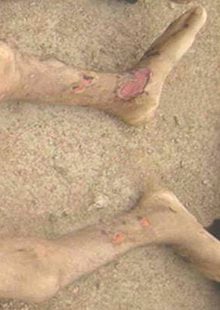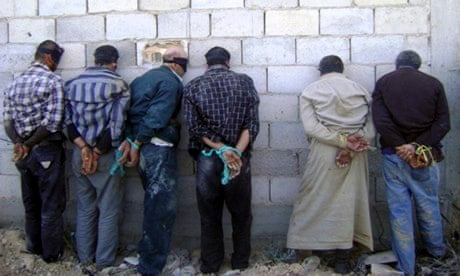The cache of evidence smuggled out of Syria showing the "systematic killing" of 11,000 detainees in Syrian jails may only be the tip of the iceberg, international aid agencies have said.
The International Committee of the Red Cross, UN bodies and Human Rights Watch have repeatedly complained of having next to no access to detainees and being stonewalled by Syrian authorities despite repeated requests to visit infamous detention sites, such as Sayednaya prison in Damascus.
They said Monday's report by three eminent international lawyers that at least 11,000 victims have been killed while in detention represents numbers in only one part of the country.
"All I know after years of trying to get access is that this is likely to eventually shock the world," one senior official from an international body told the Guardian, on condition of anonymity. "What we have seen in the [war crimes lawyers'] report broadly reflects what we have pieced together over the past few years."
Syrian activists say an estimated 50,000 detainees are unaccounted for. Tens of thousands of Syrians have been held in the country's infamous detention centres and released, often after months of deprivation and torture.

Monday's revelations drew widespread condemnation and were held up by the lawyers – all of whom have experience in prosecuting war crimes under international law – as "compelling" evidence in any legal forum. Amnesty International said the evidence should be central to the first face-to-face talks since the war began between opposition and regime officials, due to start in Switzerland on Wednesday.
Philip Luther, of Amnesty, said: "If confirmed, these would be crimes against humanity committed on a staggering scale. It certainly raises the question once again why the security council has not yet referred the situation in Syria to the prosecutor of the international criminal court.
"Geneva II must demand the disclosure of the fate of all persons subjected to enforced disappearance, secret detention or abduction, including civilians, soldiers, fighters and suspected informers."
Most of the 55,000 images taken of the victims were shot by one official photographer. Other photographers are attached to security units elsewhere in the country and are likely to also have been asked to provide visual evidence of deaths.
Each main city in Syria has numerous large prisons, off limits to all but elite military and security units but known to hold large numbers of detainees.
Syria has one of the most extensive state security systems in the Middle East. Before the uprising citizens feared the pervasive reach of more than 15 agencies, which was supplemented by the eyes and ears of the Ba'ath party, whose members were well-attuned to dissent against President Bashar al-Assad and his senior officials.
Since the first stirrings of uprising in March 2011, security chiefs have been busier than ever. The military intelligence, air force intelligence, and politicalsecurity branches have been among the most active, detaining large numbers of citizens, especially in areas held by opposition fighting groups. Syrian rebels and foreign jihadists have also been detained.
International bodies in Turkey, Jordan and Lebanon have reported they are overwhelmed by the number of families reporting the detention of their relatives. The full scale of the brutality inside Syria's prisons, they say, may never be known.
Refugees outside Syria talk frequently about missing relatives. Conversations in recent months have seemed increasingly desperate, as those who have fled Syria have ever-decreasing means of finding information about those they left behind.
"They came to take him in June," said Subhi Ahmed, a refugee from Aleppo now living in Beirut, of his son, Mohammed Ali. "It was the air force intelligence and we don't know where he is now. We have not heard a word. We went to the prison before leaving Syria and we have called many times. There is nothing."
Those who have been released from such facilities have told the Guardian and international investigators of the widespread use of summary executions. Detainees have also spoken of torture being routine. In a 2012 report Amnesty International itemised 31 methods of torture that it said were regularly used on prisoners. Figures complied by aid agencies suggest the number of detainees may be more than four times higher than the accepted figure.
The most rigorous process to establish a precise number has been conducted by Razan Zeitouneh, a Syrian activist and human rights lawyer who worked with the Violations Documentation Centre – an organisation that has gathered figures on Syrians in detention since the start of the uprising. Until she too disappeared late last year, Zeitouneh's group had accounted for more than 47,000 missing citizens. Zeitouneh was seized from an opposition-held district near Damascus. Unlike the bulk of those whose cases she documented, Zeitouneh is believed to have been seized by jihadist groups. She has not been heard from since.
In Aleppo early last year a Guardian investigation uncovered evidence of executions carried out in two regime intelligence bases in the west of the city. All of the victims had travelled from rebel-held east Aleppo. Several of those who had been released recounted their stories.
One of them, Abdel Rezzaq, 19, was detained in an air force intelligence prison. "I was living in Bustan area, working as a carpenter," he said. "I went downtown [in west Aleppo] to buy a falafel sandwich. The military caught me and beat me. They said I am with the Free Syria Army. They beat me for eight days day and nights and demanded I confess.
"I was arrested on 10 October and stayed [in prison] for about three months. Before I left the prison they took 30 people from isolation cells and killed them."
Rezzaq said he was being held within earshot of solitary confinement cells and the area where he alleges prisoners were taken and executed. "They handcuffed them and blindfolded them and they were torturing them till they died. They poured acid on them. The smell was very strong. Then we heard gunshots. The next day they put me and some of the others in front of men with guns, but they didn't shoot. They freed me later that day."

Comments (…)
Sign in or create your Guardian account to join the discussion